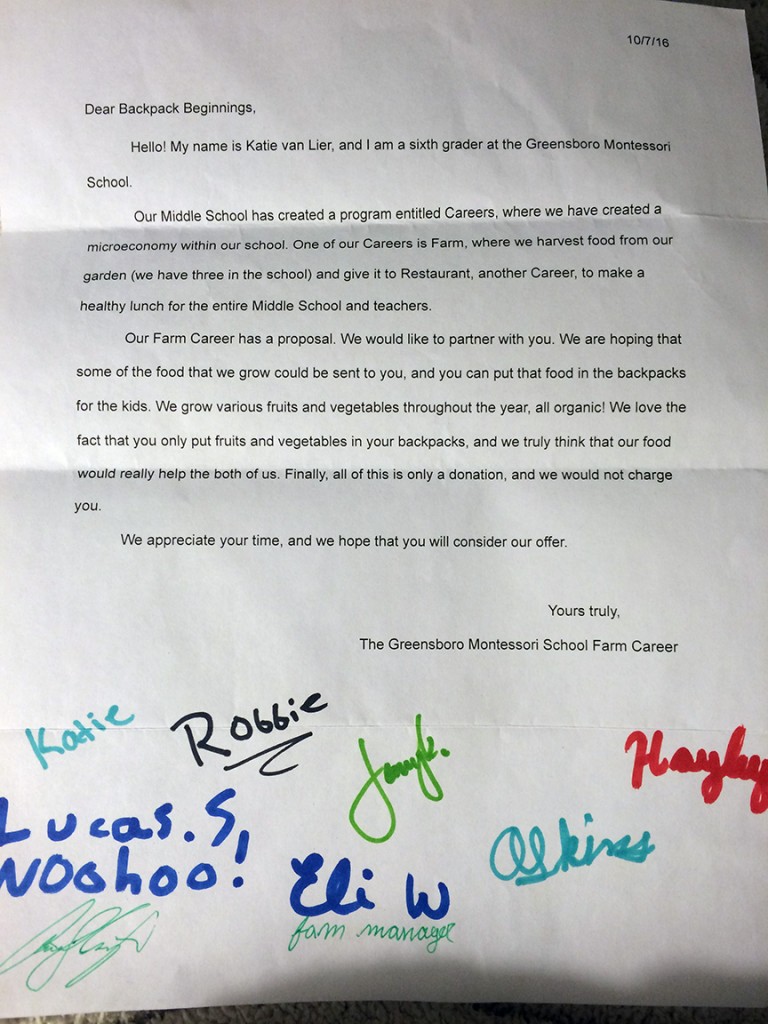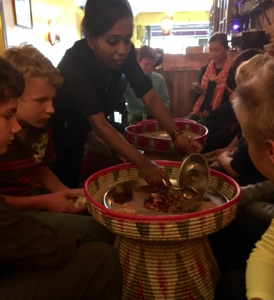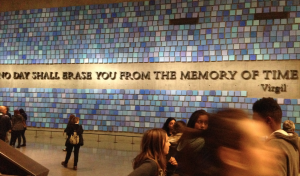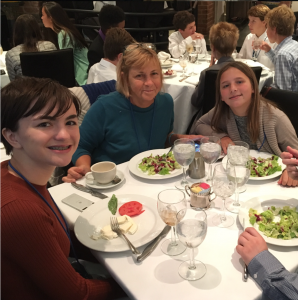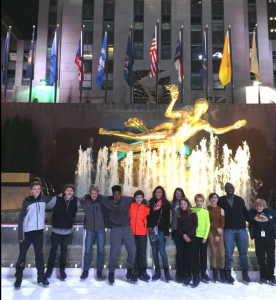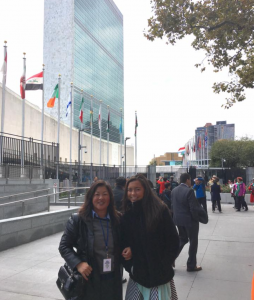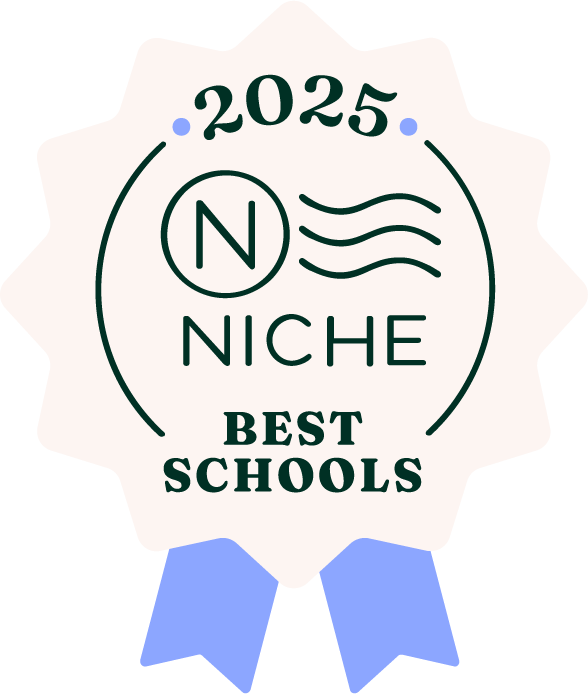Greensboro Montessori School middle school students are excited to be giving back by donating produce harvested from our gardens to BackPack Beginnings. Last Friday marked our first official donation. Students within the Farm Career from the School's microeconomy program harvested two full crates of persimmons, peppers and bags of mixed greens, slated to go to students in need from Jones Elementary.
Several weeks prior, students sent a letter to BackPack Beginnings, extending their support and stating their eagerness to work with them. Then, our eighth grade Farm Manager called Tessa Kirkpatrick, Fresh Food Coordinator at BackPack Beginnings, to arrange a pick up for Friday.
Our relationship with BackPack Beginnings offers a wonderful example of how Greensboro Montessori School's unique middle school programs prepare students to be proactive, mature communicators who are capable of adult interaction. It also illustrates how our students want our school community to experience health and well-being while also helping the Greater Greensboro community to be “full” and nourished. We plan to continue to donate weekly to the BackPack Beginnings Fresh Food Initiative and hope that this is the start of a beautiful partnership.
More about BackPack Beginnings and the Fresh Food Initiative
BackPack Beginnings is a 100% volunteer 501(c)(3) organization focused on delivering child-centric services to feed, comfort and clothe children in need. By ensuring food and basic necessities are given directly to children in need, BackPack Beginnings makes a positive and lasting impact on their health and well-being. The organization was founded six years ago by Parker White, a local mom who wanted to provide hungry children with food over the weekends. BackPack Beginnings has since expanded beyond food back packs and now includes comfort back packs, clothing pantries and food pantries.
BackPack Beginnings' food back packs and pantries are enhanced by the organization's Fresh Food Initiative. Fresh fruits and vegetables improve children’s nutrition, help prevent chronic health issues and curb childhood obesity. More and more research also points to diets rich in fresh foods improving children's ability to learn and their overall school performance.
Led by volunteer Tessa Kirkpatrick (one of our very own Greensboro Montessori School parents), the Fresh Food Initiative focuses solely on making fresh fruits and vegetables available to children in need. Tessa coordinates with multiple agencies, churches, schools and community gardens each week to gather and redistribute fresh food throughout the county. Since July 1, 2016, the Fresh Food Initiative has distributed over 10,000 pounds of produce.
GMS: Tell us how your trip started
Jean-Lou: On Sunday we flew to New York. After we checked in at our hotel, we met some of the students from other schools. There were eight or nine other Montessori schools from different states and also the Dominican Republic. There were over 150 students at the conference.
Isabel: For most of the day on Monday, we heard presentations from many different NGOs [non-governmental organizations] about the work they are doing to help people around the world. Some of the organizations were Save the Rain, Vision For and From Children, Room to Read, and HeForShe.
Click Here to view a brief clip from the NGO presentation forum. Excerpt provided by chaperone, Joan Tao.
Jean-Lou: That day at lunch we went to an Ethiopian restaurant and for dinner we ate at a Moroccan restaurant. Later that night we met up with kids from two of the other schools and had a great time ice skating in Rockefeller Center.
GMS: Was there one aspect of the trip that was your favorite or was the most memorable?
Isabel: I loved being in New York City and everything about this trip. For me, the most memorable part was visiting the 9/11 Memorial and Museum. It is hard to describe the feeling of being there, but it helped me put into perspective all of the people who lost their lives. At the memorial fountain, you can read the names of all of the people who died that day. What I thought was really cool, is that white roses had been placed by the names of people to celebrate their birthdays.
Jean-Lou: I agree that being there was hard to describe. It was just like the quote that we saw on the wall of the museum. I took a picture of it with my camera. “No day shall erase you from the memory of time.”
GMS: Tell us about your tour of the United Nations building.
Jean-Lou: We visited the General Assembly Hall and an art exhibit about clearing land mines. We saw lots of different rooms and sculptures in the United Nations building and each had been contributed by a different country. On Tuesday, we also met with delegates from the Sierra Leone mission. One of the reasons we chose their mission is because our class will be reading the book, A Long Way Gone, later this year. It's a memoir of a boy growing up during the civil war in Sierra Leone.
Isabel: The delegates from Sierra Leone told us about the history of the country and how it was founded by Portuguese explorers who gave the country its name. It means “lions in the mountains." We learned about the civil war that broke out in the 1990s and then how the Ebola epidemic impacted the country a few years ago.
Jean-Lou: Before the Ebola outbreak, they had a rapidly growing economy, but then, all of the international companies withdrew. They made some very strict health rules to help control the spread of the disease. The delegates told us about their country's current president, Ernest Bai Koroma, and how their economy is starting to recover. It was sad to learn that after the Ebola epidemic many of the children were left without parents. But the delegates told us that in Sierra Leone there is a belief that everyone in the village is responsible for raising every child.
GMS: Tell us more about what you learned from the non-governmental organizations
Isabel: Many of the people giving the presentations were college students and that made me realize you don’t have to be an adult to make a difference. Actually, there was a 15 year old girl who told us about the organization called Vision For and From Children.
GMS: Have you thought about which organization you will choose for your follow-up presentation to the community?
Jean-Lou: I hope to do my presentation on the organization Room to Read that was started in Nepal. I was surprised to learn there are schools around the world where the children don’t have any books to read. This organization provides books for schools to help children learn to read in their native language. The organization also works with the governments in those countries to help teachers and also supports the education of young girls.
Isabel: I am planning to do my presentation on HeForShe which builds awareness about the issues of gender equality and specifically getting men and boys involved in the pursuit for gender equality. I also think its cool that Emma Watson [British actor from the Harry Potter movie series] promotes this cause and is the UN Goodwill Ambassador for women.
GMS: How will you stay connected to this experience and share it with you classmates.
Jean-Lou: At the end of the conference we voted to decide which organization we would work together to support. We chose Save the Rain which builds water catchment systems for villages that don’t have clean drinking water. To start, we are planning to use the money we raise through the Middle School Rock-a-thon and the proceeds from the lunch we serve at the Greensboro Montessori School International Fair to donate to Save the Rain.
In this GMSCA interview, we invite you to meet Sophia Dubrovsky, Alex Trestman and their sons, Luka and Ethan, ages four and two, respectively. This interview was conducted by Amy Blanton, GMSCA Communication Coordinator, and fellow Montessori mom.
We were excited to recently catch up with Sophia and her family to learn more about them! It was such a pleasure to interview Sophia as she is a beacon of kindness, warmth and light. You may recognize Sophia from the GMSCA Events Team. Last year she led the effort to organize our school's International Fair which is an annual event held in late January.
GMSCA: Hi, Sophia! Thank you for being our first GMSCA feature family for 2016. We are so excited to chat with you! Tell us about a bit about your family!
Sophia: We moved here from Connecticut and remain in Greensboro mostly due to the community we've found at Greensboro Montessori School. Alex works for Honda Jet, and I have my own consulting company called Plant Based Made Easy. Luka started at Greensboro Montessori when he was 18 months old and is now in his second year of Primary in Isabelle and Gail’s classroom, and Ethan just started his first year in Toddler with Skye and Marie.
GMSCA: How did you end up at Greensboro Montessori School?
Sophia: We toured the School when Luka was just 14 months old. I immediately felt at home, especially in the gardens. I knew instantly that this is where I wanted my kids to spend their days. I love the exposure to the outdoors, and the opportunity they have to develop into their own people. It is a very lovely, cozy environment that I felt would allow Luka (and later Ethan) the freedom to explore. Greensboro Montessori is not a cookie cutter program; it gives children the opportunity to mature into their own interests. That was important to our family!
GMSCA: Tell us about your involvement in the GMSCA.
Sophia: Being part of the GMSCA has been wonderful! All of our family and friends live in Connecticut. It wasn’t until joining the GMSCA that I felt like I had found my tribe. We love how community-focused the School is, and it has given us a reason to grow roots in Greensboro. Volunteering is a great way to meet other families. You can volunteer as much or as little as you want. I’ve loved being a room parent for Luka's and Ethan’s classrooms; it’s a great way to be involved with the life of the school and support the teachers. Last year I was the chair of the International Fair and it was an incredible experience reaching out and learning about all the different cultures represented at our School. If anyone is looking for a way to get involved with the community, show up to our next monthly GMSCA meeting.
GMSCA: We can’t wait to see what is in store for this year’s International Fair in January! Tell us more about your sons, Luka and Ethan.
Sophia: Luka and Ethan are both adventurous and charismatic boys, and Greensboro Montessori has been instrumental in Luka’s growth over the last four years. I love that he has a place to explore without the pressure of workbooks or homework. Ethan just enrolled this fall and the toddler program is a great outlet for his strong desires for gross motor play.
GMSCA: You mentioned you run your own consulting firm. Please give us a window into your work with Plant Based Made Easy.
Sophia: I am passionate about nutrition and sharing with the community about how easy and monumental a plant-based diet is for your whole family! I offer cooking classes, consultations, and I frequently post reviews and recipes on my blog.
GMSCA: Thank you so much for your time and for sharing about your family, your work and your deep connection to our School!
If you are a parent of a Primary student then you may have wondered about the square pieces of paper with tracings of geometric shapes that your child brings home in her work folder. When she tells you what it is, you may ask her to repeat herself because it sounds like she is calling them "metal insects." Secretly, you think to yourself, "funny, these don't look anything like insects." And you would be right!
These designs are made with a fundamental Montessori material known as the Metal Insets.
The Metal Insets, predominantly found in the Primary and Lower Elementary classrooms, are used to develop a core set of skills that build upon one another in sequence. In the Primary classroom, this material is the first direct preparation for handwriting. The introduction to the Metal Insets usually follows a lot of indirect preparation for handwriting that is developed through the use of the Practical Life materials and the Sensorial materials (e.g. the three finger pincer grasp used with the small tongs, eye dropper, and knobbed cylinders aids the child in correct pencil grip).
Becoming proficient in using a writing instrument is a long process. When children work with the Metal Insets, they engage and practice a host of fine motor skills including lightness of touch, evenness of pressure, continuity of line, and control of line. Not to mention, this work also aids children in the development of concentration, memory and a sense of order (all necessary for executive function).
The physical material that is displayed on the shelf is both beautiful and organized in appearance. The Metal Inset materials consist of ten geometric shapes that each fit into a corresponding metal frame (like a puzzle piece). There are five straight-lined figures and five curve-lined figures: square, triangle, rectangle, pentagon, trapezium, circle, oval, ellipse, curvilinear triangle, and quatrefoil. The shapes correspond directly to the curves and angles found in the letters of the alphabet.
Beyond preparing and strengthening the hand for handwriting, there are 7 different presentations of Metal Insets that increase with difficulty starting with the simple tracing of shapes to the gradation, design and superimposition of shapes and colors. Lower Elementary students often revel in making intricate patterns by combining the shapes and observing their geometric proportions and relationships to one another, laying the foundation for true work in geometry.
Click here to learn more about the Metal Insets on www.montessoridaoshi.com
“He needs structure.” It’s a phrase we commonly hear in reference to young children, but I recently heard it used to describe a freshman in college. He had excelled academically in high school. He then enrolled at the University South Carolina only to fail out his first year. What was he missing?
Conventional education has put all of its focus on the regurgitation of academic information. The teacher gives information to students, usually orally, and then the students are expected to repeat it back through homework and exams. Good memorization equals good grades.
The Montessori method creates a learning environment to support the student’s whole development. For instance, toddlers are naturally independent beings. Everyone has heard a two year-old say, “I want to do it myself!” There are many parents too scared to let their children do things themselves. Instead, parents should ask themselves, “What are the risks in this activity?” A skinned knee? A small burn? A spill? Disappointment? Or is it death? What are some acceptable risks for children, and do these risks change as children grow?
When parents observe our Montessori toddler classes they say, “He just poured his own water!” They are astonished to watch children clean a spill or wash a dish. What are the risks in these activities? A spill? Maybe some wet clothes? Alternatively, what are the benefits? Independence, confidence and a willingness to simply try. Maria Montessori said, “Never help a child with a task at which he feels he can succeed.” Even at 18-months-old, we are empowering our students to direct their own success.
Which brings me back to our protagonist, the college freshman. The Montessori method fosters the development of independence, risk-benefit analysis, problem solving, planning, organization and time management, all key elements of executive function skills. These are the skills our children need for success in school, at work and throughout life. These skills are missing from traditional education because they cannot be taught in a single lesson and qualitatively assessed and graded. These are the skills the freshman was missing when he left home for college. He did not fail because the classes were too difficult. He failed because he wasn’t able to self-regulate his behavior, manage his time, care for himself and simply get to class.
Structure is not a parent micro-managing every minute of her child’s day. In the classroom, it doesn’t have to look like desks in rows with a teacher at the front of the room following one lesson plan for the entire group. In fact, if you Google, “What is Structure?” the first definition is “the arrangement of and relations between the parts or elements of something complex.”
The structure embedded in a Montessori classroom reflects this “complex” ability. It is both overt and organic. The obvious structure comes from Maria Montessori’s research-driven curriculum which identifies developmentally appropriate lessons, limits and responsibilities for students as individuals. Montessori-trained faculty know what each student needs and appropriately provides access to the materials, lessons and concepts the student is ready to learn.
The organic structure comes from multi-age classrooms, a hallmark of the Montessori method. Each child is a member of a community spanning three-year age groups. Students must take responsibility for themselves while also navigating multifaceted relationships between students of varying ages and abilities. The younger students look up to the older students who, in turn, mentor the younger students. They create their own structure by reinforcing positive behavior and reminding each other how to care for themselves and their community as a whole.
Maria Montessori also said, “The children in our schools are free, but that does not mean there is no organization. Organization, in fact, is necessary…if the children are to be free to work.” Greensboro Montessori alumni consistently thank us for the academic, social and emotional preparation their Montessori education gave them for high school, as well as college. We’re delighted and thankful they choose to stay in touch and share their success with us.
In August at our GMS alumni reunion, we caught up with Harrison McClain-Rubin (GMS Class of 2010), a junior in the Honors College at University of North Carolina-Greensboro. We were eager to learn more about his recent study abroad experience in Germany, plus how his nine years as a student at GMS shape his perspective on the world.
GMS: What inspired you to study abroad in Germany last semester? Tell us about one of the highlights of your experience.
Harrison: Being a political science student at UNCG, I had programs available in Poland, Sweden, the United Kingdom, and Germany. My fascination with German history elevated her above the other countries, plus her central position in Europe was perfect for all the travel I hoped to accomplish. I met so many great people while studying at the University of Mannheim that I now consider lifelong friends. It is hard to think of a single highlight of the trip, but one of the best things that happened resulted from my decision to go to Deutsche Bank to create a bank account one morning. This one morning I was tired (still jet-lagged), late to a bank appointment, and lost in this foreign city. By the time I arrived I found myself behind four French Canadian strangers. For some reason we started to talk, then we grabbed lunch together and proceeded to explore the city. By the end of the day my new French Canadian friends asked if I wanted to go to Munich for the weekend. In my head, I thought, “I barely know these people…maybe some other time… and shouldn’t I start to study?” But in the end, I took the risk and went to Munich. I decided to leave my comfort zone and go on this trip. It was the best decision I could have made because I made four great friends. We bonded during our time in Munich and it helped set the foundation for the best six months of my life.
GMS: Do you think you see the world differently as a result of being a graduate of a Montessori school? If so, how?
Harrison: Having been in Montessori from kindergarten to 8th grade I believe I have a more creative perspective when it comes to solving problems. When problems arise, I do not feel limited by the circumstances and I am able to think critically and creatively to figure out solutions.
GMS: What do you value most about your years at Greensboro Montessori School?
Harrison: I value the teaching environment. I have always been more of a hands on learner and Greensboro Montessori gave me the platform I needed to thrive and allowed me to focus on my passion for social sciences. The ability to have one on one lessons and focus on my specific needs was pivotal in my early education.
GMS: How did GMS prepare you for your high school and collegiate success?
Harrison: Greensboro Montessori gave me the tools to tackle long-term assignments and taught me to think critically which I fear a fair amount of my fellow students in high school and, even now, in university are still developing these tools. By the time I had left GMS I had written multiple longer papers, critically discussed and analyzed novels and conducted science projects. Leaving Montessori I felt confident in my abilities as a student and I did not feel overwhelmed once I left my graduating class of eight at GMS to my freshman class of 400+ students at Grimsley.
GMS: What are some of your proudest accomplishments?
Harrison: My proudest accomplishment has been taking the initiative and deciding to go to Europe for six months, to a country where I did not know the language or any people. It was an important decision to take that step and just be open to what happens. I discovered how easy it is to travel, meet new people, and participate in local events. I grew more confident and open to new things. To other students considering traveling abroad, my advice would be this - don't worry if you can't do everything, it's only natural and don't feel that you have to be busy every minute of every day. It is just as important to take time for yourself and to relax. Your time abroad doesn't need to always be a theme park ride. The best thing I did for myself was slow down and enjoy the smaller things like spending time in a park with a friend, go for a run, or even slow down and binge a Netflix series. Mannheim became my second home. I was able to spend some time traveling, but I also spent a lot of time just enjoying Mannheim. My time abroad opened my eyes to new experiences and the opportunities that rest outside of the United States. Attending the University of Mannheim was the best decision I could have made.
GMS: Where do you see yourself in five years?
Harrison: In five years I hope to be back in Europe. My time in Europe opened my eyes to life beyond the United States. Who says I have to go to graduate school in the U.S.? Why not Europe? And as for now that is my goal. Once I am finished at UNCG, I hope to attend graduate school in Europe and continue to travel and see the world.
Few things are quite as alarming to parents as being smacked by their once-serene toddler, or watching her use aggression against another child. For so many of us, peaceful conflict resolution and gentle interactions are among the most important values we strive to instill in our children. It can be easy to wonder how toddlers in perfectly peaceful households can suddenly turn all Vin Diesel on those they love the most!
Almost all young children experiment with aggressive behaviors, even in the very best homes and toddler programs. All toddlers - even those who are never exposed to physical aggression or violent imagery - are wired to resolve conflicts in ways that are reactive and impulsive. Because they haven't yet mastered verbal communication, their hands are often the medium through which they express how they feel. On top of that, they are not yet capable of empathizing with others to understand how their actions feel to those on the receiving end. Behaviors like hitting and pushing offer a quick release to their feelings of frustration, get others out of their space - and, for bonus points, they get BIG reactions from grown-ups. Toddlers crave attention, and even the negative variety can feel gratifying. Moreover, getting an adult or another child riled up offers a little taste of POWER - a feeling that’s in short supply in a small child’s life. Therefore, toddlers will often repeat unwanted behaviors over and over just to experience that rush of emotion, and to see how the sequence of reactions plays out each time.
Your toddler knows you love him unconditionally, regardless of his actions - so you're a safe target for behaviors he wants to understand and explore, even if they are negative. In most cases, the best response is as LITTLE response as possible: "No hitting. That hurts me," then moving physically away from the child. You can say, "I can be with you when you're gentle." At school, we may ask children who are behaving aggressively to move away from the rest of the group; do some deep breathing (smell the flower [inhale], blow out the candle [exhale]); then ask them to touch our hand gently to show us they are ready to be close to others again. When they are calm, we help them to recognize the impact of their actions: “Your friend is crying. It hurt when you hit her.” Then we model the language the child might use in the future in lieu of the aggressive behavior: “You can say, ‘Move over, please.’" Toddlers learn via LOTS of repetition, so don't be surprised or discouraged if you find you are using these interventions over and over with seemingly little result. They are programmed to test certain behaviors again and again before they accept that the result is the same every time!
Of all the things we cover in the toddler curriculum, none is more important than teaching children how to exist in a community with others and resolve conflicts peacefully. Monitoring the children for their safety and well-being, and seizing every opportunity to teach prosocial behavior, is incredibly important to everyone on our Toddler faculty. With patience, good modeling, and consistency in our approaches at home and school, we can help toddlers to master alternatives to the "rough stuff" and become caring, empathetic members of our school family!
Dear Parents, Alumni and Friends,
As the search for our new Head of School gains momentum, I wanted to take a moment to re-introduce the Search Committee and update you on the exciting work in which we’ve been engaged. The Board of Trustees created the Search Committee to help identify candidates for the permanent Head of School position, and we humbly ask the entire community to be involved in this important process. The Search Committee is dedicated to a professional, open and inclusive process and is looking forward to keeping you informed along the way. Our Committee members are listed on the right sidebar of this page for your easy reference.
As announced at Back to School Night and upon recommendation from the Search Committee, the School has engaged the services of Carney, Sandoe & Associates (CS&A), a nationally recognized educational recruiting firm specializing in independent schools. We selected CS&A after thorough research, interviews and reference checks and are confident the School will benefit from CS&A's nationwide network of contacts and industry expertise in Head of School searches.
Another tremendous advantage of partnering with CS&A is the ability to work with a dedicated, personal consultant throughout the entire process. Marlene Shaw will serve in this capacity for Greensboro Montessori School, and we are looking forward to the rich experience and caring focus she will bring to our search.
Marlene is a former Head of School at Chatham Hall School in Chatham, Va. and St. Mary's Episcopal School in Memphis, Tenn. Marlene holds a Bachelor of Science in Secondary Education from Louisiana State University and a Masters of Education in Counselor Education from the University of New Orleans. She has also completed postgraduate work in financial stability, advancement and major gifts for independent schools and has attended the Harvard Counseling Institute. For the last four years, Marlene has worked as a senior search consultant for CS&A.
Marlene has already begun working with the Search Committee and School administration to cultivate her relationship with and knowledge of our School. We are excited to welcome her to campus from September 27th through 29th to further her understanding of our unique needs for our next Head of School. While here, she has requested to meet with you, our parents and friends of the School, along with the Teaching Faculty, Administration, Alumni, Search Committee and Board of Trustees.
Prior to her arriving, Marlene would like to gather preliminary views from the community via an online survey which will be sent this Monday, September 19. On behalf of the Search Committee, I respectfully request you make every effort to participate in this survey. Marlene will be recruiting from a large variety of excellent educational leaders who will want to understand Greensboro Montessori School through the eyes of all of us in our school community. Through your survey input and the insights from her visit, Marlene will work with the Search Committee to formulate the formal Head of School position description which will be a primary communication piece used for recruiting candidates.
I look forward to keeping you informed of our efforts and progress throughout the search process. If you have any questions or specific input for me, the Search Committee or Marlene, please don’t hesitate to reach out to me, and more importantly, please take advantage of upcoming opportunities – like the survey and soon-to-be-announced meeting times with Marlene – to provide feedback.
Sincerely,
David Bouska
Search Committee Chair
Among many of the most wonderful qualities of Greensboro Montessori School are our parent community and gardening program. On Friday, October 7, we will unite these bodies at an intimate Seed to Table Dinner at the Proximity Hotel. Leigh Hesling, Executive Chef of both Green Valley Grill and Print Works Bistro, and his team will prepare an exquisite meal for us using fresh ingredients from our permaculture gardens and local farms. Even better, Chef Hesling will entertain and delight with a cooking demonstration of each course prior to our enjoying the locavore cuisine. This format mirrors what our students experience in their environmental education lessons on a regular basis.
This exclusive, adults-only evening will include a starter, an entrée and a dessert, each paired with wine. We will also feature a designer cocktail and craft beer. You're probably wondering, "What's the occasion?" We actually have a lot to celebrate:
- Our permaculture gardening program is 20 years old this spring. What better way to celebrate the seed-to-table cycle our children learn than to experience it for ourselves.
- The GMSCA is already hard at work planning the Fall Festival on Sunday, October 9 on behalf of our students, and we thought it was only fair to plan a date night for the adults.
- October marks the beginning of Greensboro Montessori School's Annual Fund. The Seed to Table dinner is a symbolic representation of the amazing things that happen when we grow together and will officially launch our 2016-17 campaign.
If you don't know much about the permaculture gardening program, take a look at our School Within a Garden page. This page gets its namesake from Alice Waters who visited our School in the spring of 2010 while in town for the grand opening of the Edible Schoolyard at the Greensboro Children's Museum. Upon touring our 10-acre campus, she called Greensboro Montessori School a "school within a garden."
The Fall Festival is our biggest annual community event and is family-friendly party on the school field. Attendees bring their own chairs, blankets and snacks and spend the entire afternoon visiting various activity stations along the perimeter of the field. Past activities include inflatables and stations sponsored by each classroom in the School.
The Annual Fund is a yearly giving campaign designed to propel Greensboro Montessori School from being excellent to exceptional. The costs to run an excellent School like ours are tremendous. Simply keeping the lights on, providing a clean environment and maintaining our impressive facilities totals $177,000 a year. It costs another $137,000 annually to ensure each classroom has excellent Montessori materials and every student has life-changing experiences through unique curriculum like the Land Laboratory. And most importantly, to provide the very best in professional, passionate and credentialed educators, the School spends $2,479,000 in annual employee salaries and benefits. There are other costs, like depreciation and interest expense, that take the School's operating budget well over $3 million.
So how does the School implement the extra touches that make us exceptional? The answer is the Annual Fund. Through the benevolence of parents, alumni, community partners and friends of the School, Greensboro Montessori School is able bridge the difference between covering the basic expenses and positioning the School to deliver exceptional educational experiences to our students.
We invite each of you to an evening of delicious food, festive camaraderie and powerful learning (not only how to cook, but also how to keep our School exceptional). Tickets to the all-inclusive evening are $100 per person and you can register online or contact Jillian Crone to pay via check or cash. Seating is limited to 50 guests, so don't delay and purchase your tickets today!
Our Primary students spent an afternoon with Paul Ibsen, Interim Head of School, late in the week. With just a touch of encouragement, they started asking him questions, mostly about his favorite things. Throughout the dialogue, Paul included stories about his time growing up in California and his first career as a helicopter pilot in the United States Coast Guard. Not everything made it into our transcription for you, but the kids certainly loved every moment of their time with him.
Q: Why do you want to be a principal here?
A: I got a call from somebody that said Greensboro Montessori was a wonderful school, and they just needed somebody to be a head of the school for a short time to help the school find somebody to be a head of school for a long, long time. They asked if would I come and help out and I said, "Sure, I’d love to help out because its such a great school."
Q: Why are you here?
A: I’m here because I like being with children. I like to see what children do, and how they learn together, and how they explore. It's so much fun!
Q: What's your favorite snack?
A: Popcorn
Q: What’s your favorite ice cream?
A: Ben and Jerry’s Cherry Garcia. You know what else I like to do too… I have two grandchildren, a granddaughter and a grandson. They live about three hours from where I live, and I love when we can get together and eat ice cream. My granddaughter is going into middle school and my grandson is in fourth grade.
Q: Do you have a cat?
A: I don’t have a cat, but I have a dog named McDuff. Have you ever read the stories about McDuff? There are some great books about McDuff, and I should come by and read some of those to you because McDuff gets in trouble a lot. We call [our dog] McDuff, and just like in the book, he is a white West Highland Terrier. When I go to bed I have to move him off my pillow because he's on my pillow when I get in bed. And he doesn't like moving very much...We have a lot of fun with McDuff.
Q: Is your dog bad?
A: He's very good, and he loves people. He won't bite people. You know what he'll do? He will lick your nose.
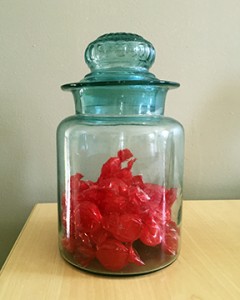
Paul's jar of hard cinnamon candies can be found on the desk in his office.
Q: What's your favorite candy?
A: You know, I like those little red, cinnamon candies. I have some in a jar on my desk.
Q: Which favorite popsicles do you like?
A: Wow, I haven't had [a popsicle in a while]. You know those orange popsicles that have the white creamy stuff on the inside? Those are awesome.
Q: What’s your favorite color?
A: Ooooh, I think blue. I have a little blue here [on my shirt]. I think blue, but it depends, sometimes I like red. I also have pink shirt that I really like...You know the color I really like? It's the green color of Greensboro Montessori School.
Q: What’s your favorite shoe, shoe to wear?
A: I don't know. Whatever I grab in the closet pretty much is fine.
Q: What’s your favorite tree?
A: You know I grew up in California, and one of my favorite trees was a tree called a Giant Sequoia. They were hundreds of years old, and they were huge. Taller than these buildings. There was one tree, and they made hole in the bottom of it. You could drive through it with your car. It was that big.
Q: What's your favorite animal?
A: Probably my dog. Yeah, I like my Westie.

